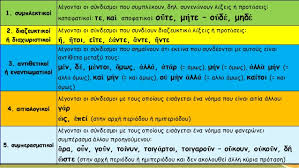Language/Ancient-greek-to-1453/Grammar/Negation
Hi Ancient Greek learners! 😊
In this lesson, we will learn about negation in Ancient Greek.
Don't hesitate to look into these other pages after completing this lesson: Ancient Greek Alphabet, Ancient Greek cases, Reciprocal Pronouns & Aspect in the Ancient Greek Verb.
Negation is the process of expressing a negative statement or idea. In Ancient Greek (to 1453), there are several ways to express negation.
Negative Particles[edit | edit source]
Negative particles are words that are used to express negation. The most common negative particle in Ancient Greek (to 1453) is οὐ (ou). It is used to negate verbs, adjectives, and adverbs.
Examples[edit | edit source]
| Ancient Greek (to 1453) | Pronunciation | English Translation |
|---|---|---|
| οὐ λέγω | ou lego | I do not say |
| οὐκ ἔστιν | ouk estin | It is not |
| οὐκ ἀγαθός | ouk agathos | Not good |
| οὐ μακρός | ou makros | Not long |
Another negative particle is μή (mē). It is used to negate nouns, pronouns, and adjectives.
Examples[edit | edit source]
| Ancient Greek (to 1453) | Pronunciation | English Translation |
|---|---|---|
| μή τις | mē tis | No one |
| μήτε...μήτε | mēte...mēte | Neither...nor |
| μή φίλος | mē philos | Not friendly |
| γυναικὸς μή... | gynekôs mi .. | Not a woman |
Negative Adverbs[edit | edit source]
Negative adverbs are words that are used to express negation. The most common negative adverb in Ancient Greek (to 1453) is οὐδέ (oude). It is used to negate verbs, adjectives, and adverbs.
Examples[edit | edit source]
| Ancient Greek (to 1453) | Pronunciation | English Translation |
|---|---|---|
| οὐδέν λέγω | oude lego | I do not say |
| οὐδέν ἔστιν | oude estin | It is not |
| οὐδείς ἀγαθός | oude agathos | Not good |
| οὐδείς μακρός | oude makros | Not long |
Another negative adverb is οὐδείς (oudeis). It is used to negate nouns, pronouns, and adjectives.
Examples[edit | edit source]
| Ancient Greek (to 1453) | Pronunciation | English Translation |
|---|---|---|
| οὐδείς τις | oudeis tis | No one |
| οὐδείς μήτε...μήτε | oudeis mēte...mēte | Neither...nor |
| οὐδείς φιλος | oudeis philos | Not friendly |
| οὐδεμία γυνή | oudemîa gunē | Not a woman |
Indefinites and negation in Ancient Greek[edit | edit source]
The history of Greek negation is interesting for theoretical understanding of negation systems Homeric Greek already shows signs of a diachronic development:
there are two series of negative indefinites, an older plain one and a newer emphatic one. The system exhibited by Classical Greek is very relevant for our understanding of the syntactic factors that shape Negative Concord. Classical Greek is a non-strict Negative Concord language.
Ancient Greek has two complementary negators: οὐ (with variants οὐχί and οὐχ), and μή, the former of which is mainly used in assertive statements and the latter in orders and wishes.
The distributional difference between οὐ and μή also holds true for their compounds, negative pronouns, adverbs and conjunctions, such as οὐδείς/μηδείς (nobody, none) οὐδέν/μηδέν (nothing) οὐδαμοῦ/μηδαμοῦ (nowhere ) οὔτε/μήτε (and not) οὐδέ/μήδε (and not, not even ) etc.
The two Ancient Greek negators (οὐ and μή), which function as markers of sentence negation, are usually positioned before the verb, as separate words, e.g. οὐ στέργει, (doesn’t love), μὴ στέργε (don’t love :imperative). Unlike in some other languages, in Ancient Greek a single sentence may contain two or more negative morphemes.
This comprises the cases of:
- co-occurrence of negators of different kinds, i.e. association of οὐ + μή and μή + οὐ
- co-occurrence of identical-kind negators, either objective (οὐ ~ οὐδείς : no one, οὐ ~ οὐδέν : nothing, οὐ ~ οὐδαμῶς : in no way, οὐ ~ οὐδαμοῦ : nowhere etc.), or subjective : μή ~ μηδείς, μηδέν, μηδαμοῦ, μηδαμῶς, etc.
The present article will focus on the co-occurrence of a negator and a negative pronoun or adverb (or some other compound negative) of the same kind, with the morpheme οὐ:
- Xen. Anab. 4.4.8. "οὐ γὰρ ἑώρων πολέμιον οὐδένα... : for there was no enemy within sight. A sentence like “I didn’t say it to nobody” can only have a positive reading, that is, it is a sentence with double negation, meaning “I said it to somebody.” The corresponding negative sentence would then be “I didn’t say it to anybody”. if the last negation in a clause is a compound negation, such as οὐδέν, μηδέν : nothing, the negations reinforce each other, i.e. the meaning of the sentence as a whole is negative, as in the following cases:
- Soph. Ant. 96–97 πείσομαι γὰρ οὐ τοσοῦτον οὐδὲν : for I will not suffer anything so terrible
- Dem. 5.15 μὴ θορυβήσῃ μηδείς : Let nobody vociferate! if the last negation in a clause is simple negation, i.e
Videos[edit | edit source]
Study ancient Greek Strongsdict Strong's Greek Hebrew Dictionary App Android[edit | edit source]
A Latent Syntax Language Model of Ancient Greek[edit | edit source]
HISTORICAL GREEK PRONUNCIATION vs. ERASMIAN[edit | edit source]
Author[edit source]
- Ευγενική χορηγία που στοχεύει να βοηθήσει μαθητές ή μη, απανταχού της Γης, που επιδίδονται στην εκμάθηση της ελληνικής γλώσσας!
- Contribution bénévole visant à aider les personnes, partout dans le monde, qui sont engagées dans l'apprentissage de la langue grecque !
- Voluntary contribution aimed at helping people, all over the world, who are committed to learning the Greek language!
Other Lessons[edit | edit source]
- Ancient Greek conditional clauses
- Tenses
- Ancient Greek Interjections
- Orthographic signs: Spirits
- Possessive pronouns
- The degrees of adjectives in Ancient Greek
- The Middle Voice of λύω : λύομαι
- Personal pronouns
- Reflexive Pronouns
- Aspect in the Ancient Greek Verb

